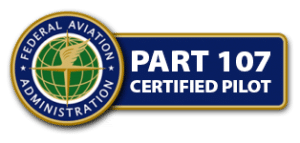
The number of providers offering drone-based commercial aerial photography, videography and data gathering services is rapidly increasing. Unfortunately, not all drone service providers are created equal. Selection of a qualified provider breaks down into two major categories:
1) Regulatory
Many drone operators, as well as their prospective Clients, are unaware that FAA regulations specifically govern the safe use of this technology and prohibit the use of drones for commercial purposes unless a) the drone is registered with the FAA and b) the pilot holds a Remote Pilot Certificate with an sUAS rating. Clients should verify pilot credentials and aircraft registration before hiring a drone service provider.
2) Safety, Ethics, Experience and Professionalism
Even if they are Certified Remote Pilots, many operators lack the necessary insurance and competence to operate drones safely, ethically and professionally. The quality of the final deliverable often depends on the skills and artistry of the operator – and these skills can vary widely. Here too, Clients should verify qualifications by asking to see samples of an operator’s work before hiring them, as well as verifying safety practices and procedures, business license and insurance credentials.

Certification and Documentation – Ask to See It!
- FAA Remote Pilot Certificate with a small Unmanned Aerial System (sUAS) rating
- FAA Certificate of Aircraft Registration
- Business License
- Insurance policy declarations and endorsements
- Pre-flight Checklist, Flight Operations Manuals, Aircraft Operations Manuals, Flight and Maintenance Logs, etc.
Equipment
A properly-equipped operator will have multiple sUAS, providing backup and redundancy for any on-location equipment issues that may arise

Crew and Roles
- FAA-certified pilot required
- Visual Observer highly recommended to help manage manned aircraft right-of-way, proximity to people, power lines, guy lines and other hazards

Safety and Operating Procedures
- Go/No-Go procedures (personal minimums such as wind conditions, cloud cover, visibility, etc.)
- What safety precautions will they utilize for your specific project and location?
- Pre-flight planning and risk management processes?
- Area and environment – proximity to airports and airspace restrictions, hazards, weather and bystanders?
- Public awareness – notify nearby property owners and residents of flight date, time, location, duration, etc.?
- Contingency planning and emergency procedures for safe exit routes in case of system failure of lost link, etc.?
Experience (as both pilot and photographer)
Pilot:
- How many hours does the pilot have?
- Are they current on the aircraft that they will be flying?
Photographer:
- What, if any, are the provider’s professional photography credentials?
- Do they possess the skills and artistry to deliver quality results?
Overall Professionalism
Does your pilot demonstrate professionalism and a commitment to FAA regulatory compliance, safety procedures, legal and ethical operations, respect for privacy, etc.?
In this inaugural blog from Aerial Decisions, we’ve provided an overview of questions to ask your drone service provider. We’d love to hear your thoughts on these issues. Please check our website at and watch this space as we expand on the above issues and more over the coming weeks and months.
- 5 Drone Photography Tips for Commercial Real Estate Projects - December 9, 2021
- 5 Reasons for FAA-Registered Drone Service Providers - August 28, 2021
- 5 Reasons for Drone Service Providers to Log their Flight Time - July 15, 2021
